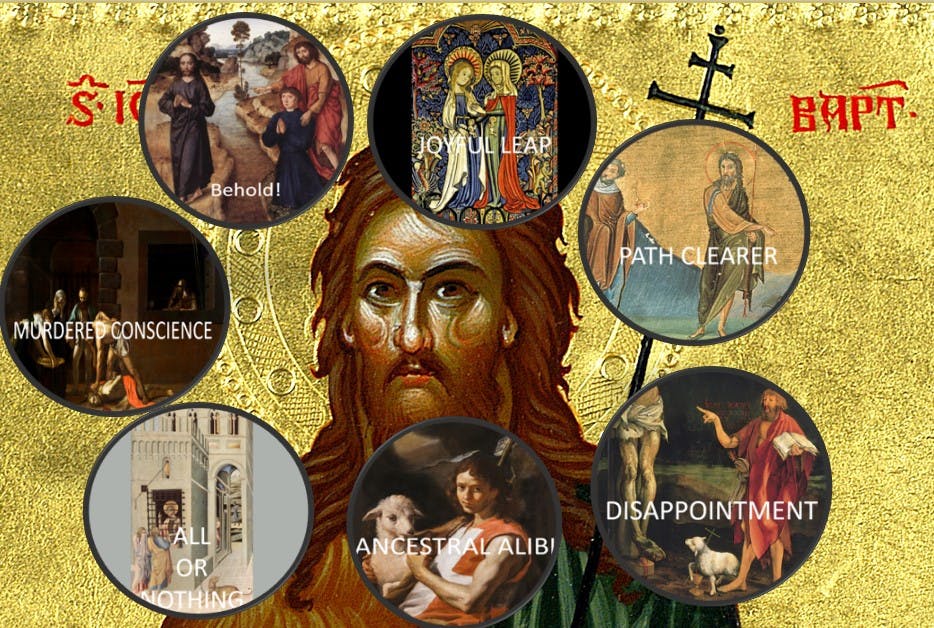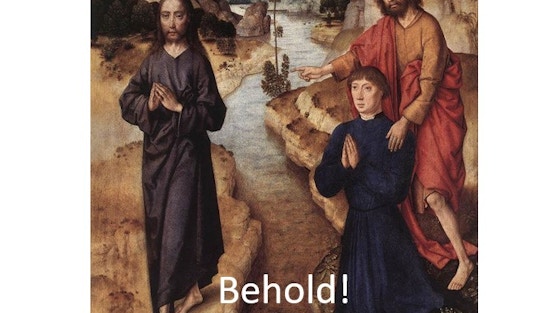Locusts and Wild Honey 7 BEHOLD! John 1:29 and 36
Dear Friends,
During Lent 2021, we offered a spiritual journey through Lent in Germany for members of the Order, their youth and its Relief Service. It was entitled "Locusts and Wild Honey" (Mt 3:4) - Fasting with John the Baptist. Through Emilie Verbeken, these weekly impulses also found their way to Belgium. Thus the idea was born to offer and publish the Lenten meditations on John the Baptist also for interested people in other countries. I thank Emelie Verbeken and Florentine Haeusgen warmly for the idea and its realization - especially for the translation from German into French and English. It would be nice if in this way our patron could help us to have a fruitful time of conversion.
To all of you a blessed Lent and renewal of soul and body,
Fra' Georg Lengerke
Probably the most frequently depicted and quoted word of John the Baptist about Jesus is: "Ecce Agnus Dei"- "Behold the Lamb of God". Twice John uses this word to refer to the passing Jesus (Jn 1:29 and 1:36).
For the devout Jews this was a key word. John identifies Jesus of Nazareth with that lamb that was slaughtered at the Passover before the Exodus from Egypt. Jesus fulfils what the Passover lamb in Egypt was already a sign of: that we will be freed not only from political slavery, but from the dominion of alienation from God (sin) and death. He is "led like a lamb to the slaughter," Isaiah says of the Servant of God (Is 53:7). "Look!" says John the Baptist, pointing to Jesus and at the same time beyond the moment. His disciples follow Jesus and see who the Lamb of God is, whom John preceded and in whom God shows himself as a man to men.
Like an echo of John the Baptist's message of life and like an interpretation of his call, the Latin "Ecce!" occurs three times in the Good Friday liturgy.
1. "Ecce Homo!" - "Behold, the man!" (Jn 19:5) cries the Roman governor Pontius Pilate in the face of the bruised Jesus, mocked as the king of jokes. And with that he says more than he wants to: "There, the man! That is what man is like. That's how you are and that's how you treat each other!" Jesus shows us the human being who suffers from others, from himself, from fallen creation. He shows us man dignified by God and degraded by man, of whose kingship only a mocking disguise remains. And he shows us the man in sin, the cursed and separated man from God. And the response of the masses does not take long: He must go! "To the cross with him!"
2. "Ecce servus meus" - "Behold, my servant", begins the first reading of Good Friday, the Fourth Song of the Servant of God (Is 52:13-53:12), in which the prophet Isaiah describes the fate of the Servant of God in 400 BC. Christians have seen a foreshadowing of Jesus' fate in it, who was tormented, disfigured, and murdered by men. In his suffering he identifies with the sickness, pain, and guilt of the world and gives himself up to have it all done to him with all its consequences in order to carry it to God. God does not leave him in death but saves him - and thus also all those who, for their part, have allowed him to make their suffering, pain and guilt his own.
3. "Ecce lignum crucis!" - "Behold, the wood of the cross!" After the Ecce homo and the Ecce servus meus, the Church unveils the cross in the Good Friday liturgy to learn to look anew. Three times she calls out: "Ecce lignum crucis - Behold the wood of the cross on which the Lord hung, the salvation of the world. Come, let us worship!" The cross is the place of man's lostness, to which God's search for the lost goes. Here is the place where Christ, "the salvation of the world", finds and saves the lost by becoming the lost himself, joining with the suffering and lost of all times and places, thus making man's lostness his place.
Here, finally, is the place where the Father does not leave the Son and those connected to him in lostness. He awakens them into the life of the found, into the life of those who seek with him, into the life over which death no longer has power.
"Behold the Lamb of God!" says John the Baptist. Therefore, on these holy days, I ask for an understanding and loving gaze of heart and mind, soul and body, so that I may learn to see Jesus more and more - in His devotion, in my neighbour and in every place where He makes our lostness His.
Fra' Georg Lengerke.

Related Posts
Locusts and Wild Honey Part 3: DISAPPOINTMENT John 1:20
| Lent 2023During Lent 2021, we offered a spiritual journey through Lent in Germany for members of ...
Heuschrecken und Wilder Honig Teil 2: WEGRÄUMER Mt 3,3
| Lent 2023in der Fastenzeit 2021 haben wir in Deutschland für die Mitglieder des Ordens, der Jugend ...
Sauterelles et miel sauvage Partie 2 : LE PREPARATEUR DE CHEMIN (Mt 3,3)
| Lent 2023Pendant le Carême 2021, nous avons proposé en Allemagne un itinéraire spirituel à travers le ...



